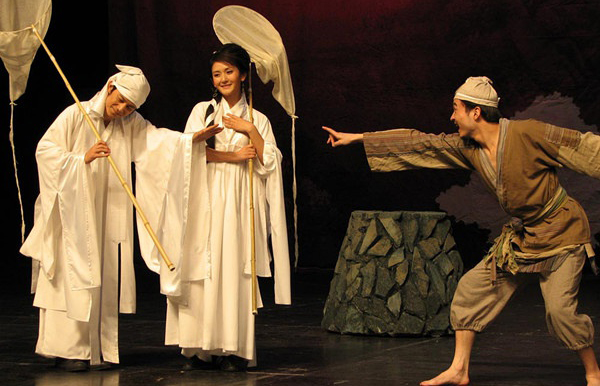Creating an artistic world beyond binary opposition

A scene in Secret Love in Peach Blossom Land starring non-professional stage actors He Jiong and Xie Na (both standing left on the stage)
Taiwan-based playwright and director Stan Lai, known in Chinese as Lai Shengchuan, was highly acclaimed for his avant-garde works a decade ago in Chinese mainland artistic circles. Lai had a modest profile back then built through print media and the limited circulation of his films on the mainland.
His turning point came in 2006 when his play Secret Love in Peach Blossom Land made its mainland premiere starring a predominantly mainland cast, including well-known TV hosts Xie Na and He Jiong, neither of whom are professional stage actors.
The play was a huge success at the box office. Lai was both lauded by mainland media for the profitability of his play and criticized for allegedly commercializing the art form. Some critics attributed the success of Secret Love in Peach Blossom Land to its star-studded cast, yet implied Xie and He’s inclusion lowered the play’s artistic value.
A stereotype persists that only professionally trained actors can perform in stage plays. However, Lai has used non-stage actors in Taiwan for more than 30 years as a theater director. His cast for the 1986 premiere of Secret Love in Peach Blossom Land included a TV host, writer and business manager whose performance sealed the play’s legacy as a classic. As a director, Lai is an advocate of “triggering actors’ motives and giving them autonomy to perform.” He has also noted the “impetus of internal motives among stage actors,” whose external behavior shouldn’t be judged.
Lai’s directing philosophy is to let actors reflect their role’s motives and feelings but not to abide by so-called principles and standards of acting. An actor’s competence depends more on their inner openness and sensibility, Lai said, than their training as an actor. TV hosts are naturally more adept at handling the tempo of comedy, as demonstrated by Xie and He’s performances in Secret Love in Peach Blossom Land.
In Lai’s plays, the world is an integral whole in which time, space, people, objects and events are intrinsically related to each other. Past and present, reality and illusion are therefore mingled and viewed as equivalents. Seemingly unrelated concepts and people are juxtaposed, with images analogous to others.
In Secret Love in Peach Blossom Land, two troupes of actors mistakenly book a theater for rehearsal at the same time. One performs a modern tragedy called Secret Love; the other performs In Peach Blossom Land, a parody of the fabled utopia described by ancient Chinese poet Tao Yuanming (366-427). Scenery, props and even the actors’ lines start to overlap with one another, infusing the tragic drama with comedy and the comedy with deeply poignant moments.
A sense of reality in the tragedy shines through the parody, enriching the layered implications of the latter: politics, love, marriage and humanity. The relationship between “reality” and “utopia” expressed in the parody enlightens the audience of the tragedy to transcend the emotional pain of individuals and reflect on the philosophical notion of life’s impermanence.
The play is hence both a comedy and tragedy, profound and understandable, avant-garde and accessible to ordinary people.
Lai’s 2008 play The Village is based on cross-Strait relations. While showing respect for historical truth, the play examines “migration” in the permanent changes of history. It does not indulge in pathos. Instead, it is more about the significance of traditions in forming a culture and tenacity in common people’s struggle for survival. It conveys antagonism based on the unique historical background. Rich in profound humanity and with a style mixing sadness and happiness, the play manages to transcend its political barriers. US-born Lai has experienced migration several times in his lifetime, leading him to develop his own understanding of cultural conflict.
The Village provides a journey into the culture of juancun, villages built to accommodate Kuomintang soldiers’ dependents after their retreat from the mainland in 1949. It serves as a hub for cultural exchange and assimilation among different people.
The depiction of history and happenings in juancun is not restricted to a single dimension in the play. The audience is therefore guided to resolve the antagonism resulting from political conflict, cultural barriers and historical misunderstandings, so that they are capable of developing a peaceful, rational attitude toward history and juancun life. The play’s focus on homesick elderly villagers eager to return to their mainland hometowns has enhanced communication between the mainland and Taiwan.
Lin Ting is from the College of Chinese Language and Literature at Fujian Normal University.
